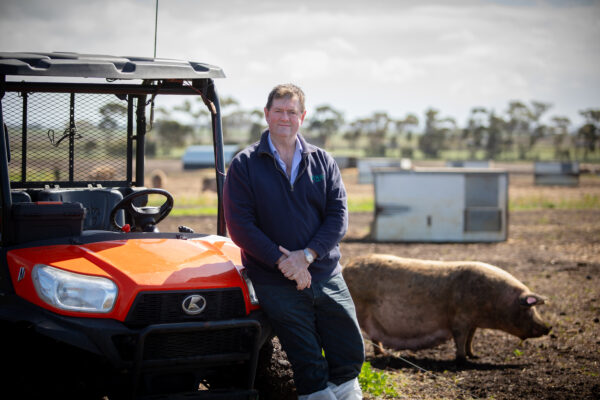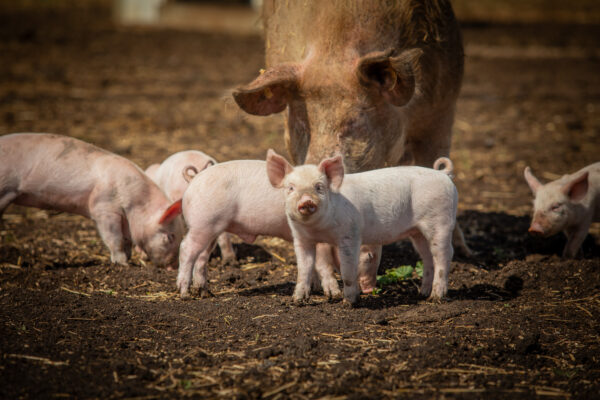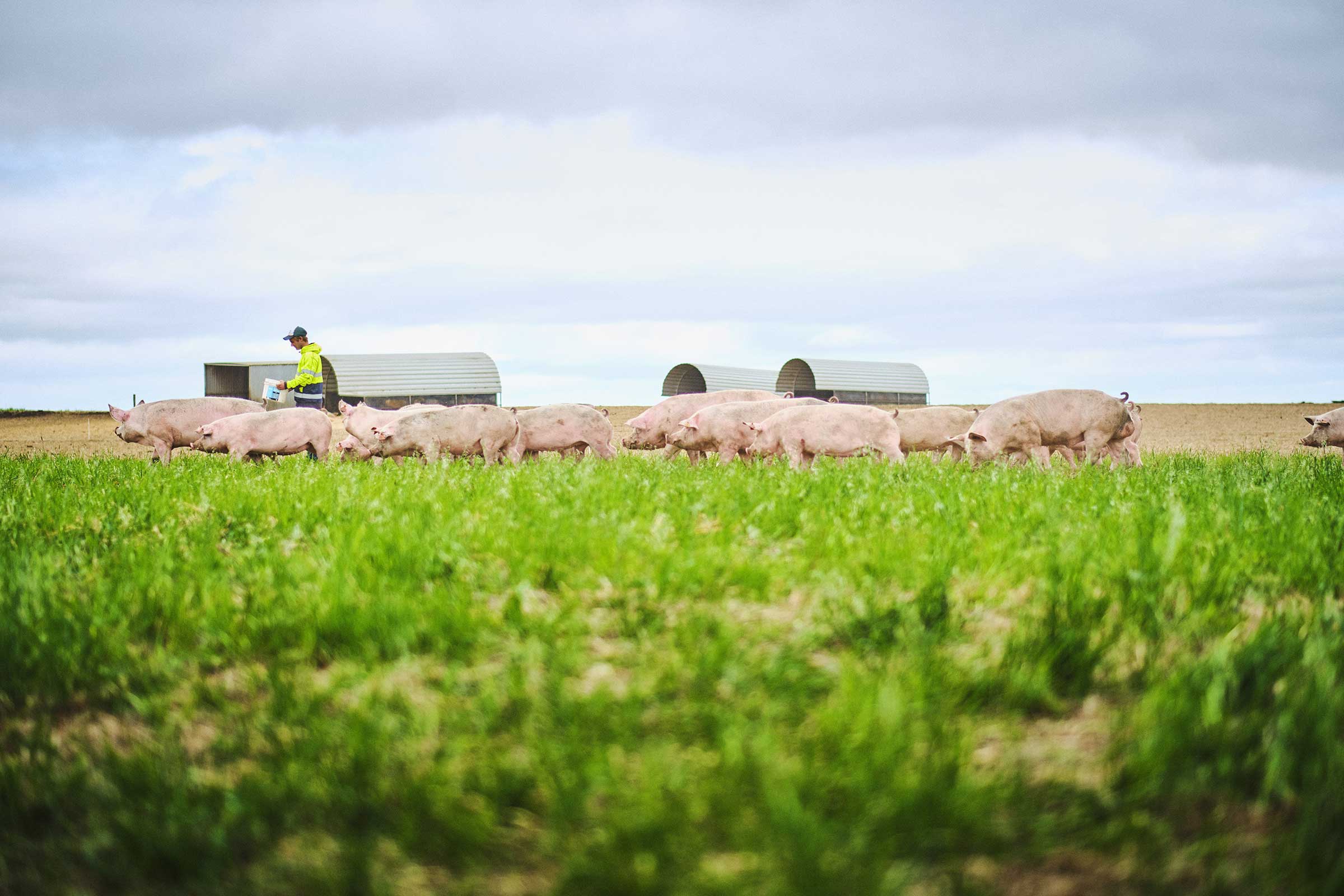Big efforts behind Otway Pork
Media article
This article appeared in the November 2023 edition of Australian Meat News. Report by Stephanie Flynn.
Few realise the extensive efforts that sit behind the production of high-quality Australian pork and the considerable challenges faced by producers. The implementation of state-of-the-art welfare and sustainability systems, on-farm biosecurity procedures as well as the drive to find efficiency gains to keep the price of that ‘pork on the fork’ affordable for consumers whilst maintaining a high nutritional and quality protein, despite rises in costs of production, are major achievements in anyone’s language. Australian Meat News spoke with the head of one of Victoria’s leading outdoor and freerange pork production companies about the systems in place to provide Australians with quality fresh pork, the challenges facing the industry and the opportunities ahead.
Mr Cameron Hall assumed the role as Chief Executive Officer of Pastoral Pork Company in May last year bringing with him extensive experience in agri-business services and the red meat industry covering production, international trading, feedlots and live exports.
Pastoral Pork Company has a long history of sustainable pork production and, in the 30 years since its inception, has expanded to encompass four breeding farms and seven locations where its pigs are grown across Victoria for its Otway Pork brand.
The company has two production streams for its Otway brand, one is a full freerange system and the other an outdoor-bred system under which its breeding sows have full access to the outdoors and piglets, once weaned, are raised in large eco shelters with no indoor dividers.
In addition to supplying pigs for its own brand, processed under contract in Victoria, Pastoral Pork Company also sells carcases on an over-the-hooks basis to a range of wholesalers and other meat companies.
Pastoral Pork Company’s key focus moving forward is to continue to expand the level of sales, through the brand, both in Victoria and into other states.
The company has also vertically integrated its product range to manufacture its Otway brand of smallgoods and exports fresh pork into the Singaporean market.
According to Mr Hall, the industry is currently facing a number of challenges the rising costs of production being chief among them given that there is a constraint in the ability to raise retail prices for consumers and at the same time increase the consumption levels of pork.

Mr Cameron Hall, Chief Executive Officer, The Pastoral Pork Company. Photo: Anthony Webster
“I think the costs of production issue is a really interesting one because we have seen costs go up globally through COVID-19 and post, the challenge is always going to be how do producers share that increase in costs with consumers,” Mr Hall said.
“There are always opportunities for research and development and always opportunities to increase our efficiency so it should not be all to the consumer.
“Right through the chain everyone has to work smarter and more effectively together to try and limit how much everyone’s costs continue to increase but, the cost increases cannot always fall solely at the feet of producers.
“As an industry, there probably is room for an increase in the retail price of pork but the challenge is ensuring both affordability and trying to increase levels of consumption at the same time.
“There is a clear price differential that we see through our brand compared to a commodity product and we know our customers are willing to pay a higher price for a high-quality branded product.
“Consumers still do not consider pork really as an every day meal, I think there is a price sensitive retail point,” Mr Hall said.
Mr Hall is of the view that the general community and consumers have a far greater interest now than they ever have before around how their food is produced and the integrity of the systems under which their food is produced, a trend he sees as growing.
His view is supported by the latest global agricultural outlook released by the Organisation for Economic Cooperation and Development in which it is projected that consumers’ environmental and animal welfare concerns are expected to change the face of global meat trade over the next decade.
Pastoral Pork’s production systems have been developed to encompass both the welfare of its animals and also a broad view of what sustainability means.
The company has chosen to raise animals for its outdoor production system on slightly poorer and sandy soil types which are then improved over a number of years with the pigs’ manure adding nitrogen and phosphorous.
A three-year rotation system has been adopted whereby the pigs are removed to an alternative location and the country is remediated then entered into a cropping and pasture phase for at least six years which draws out the additional nutrients.
The straw from the Farrowing huts and shelters is also utilised in the soil remediation as a compost adding to the water-holding capacity of the soil.
Pastoral Pork then purchases grain grown on the land for its production system to be used as feed.
“Everyone is focused on zero carbon but zero carbon in a livestock sense looks very different to zero carbon in a manufacturing or community sense,” Mr Hall said.
“We, as part of the agricultural industry, have a vital part to play in reducing emissions by growing crops, pastures and trees that use and sequester carbon whilst also producing food for consumption.
“Reducing carbon and methane levels are important, equally important, however, is the sustainability of the land that we use, the water that we use and the environment in which we grow our food source.
“So, to me it is not one or the other, it has to be a balance around leaving the soils in a better way than we found them and being able to significantly reduce the levels of synthetic fertilisers that we use through our production systems, these all contribute to the total picture,” he said.
In addition to animal welfare and sustainability practices, on-farm biosecurity systems are also a major focus of our pork producers on a day-to-day basis and, while adding additional costs to production, are seen as vital given the potential impact of a disease incursion as we have seen in recent times with the outbreak of Japanese Encephalitis across four states.
Pastoral Pork’s biosecurity systems are extensive and cover anyone and everything entering its farms as well as its own staff members who are required to quarantine before returning to work if they have travelled overseas to at risk locations.
According to Mr Hall, all livestock producers including pork producers are waiting to see the details of the Government’s latest move to impose a biosecurity levy on the sector. The proposed levy, announced in this year’s Federal Budget, is intended to be imposed on producers as of 1 July next year to collect $50 million annually as a cost recovery mechanism toward the $1.03 billion in funding allocated to the nation’s biosecurity surveillance system over the next four years.
“We are looking with keen interest at how the rates will be set across the various parts of agriculture but also around how people travelling to high-risk countries are also going to contribute to cover some of that risk,” Mr Hall said.
“I think industry does have a role to play, however, within the pork production sector there are no pigs imported into Australia, we cannot import live genetics, the biggest risk of introducing a significant disease into the pork production sector, or for that matter into agriculture in general, comes with people and, generally, with inbound or outbound tourists,” he said.
While overcoming these challenges are an integral part of the day-to-day life of our pork producers, Mr Hall also sees opportunities ahead for the sector including increasing its exports of fresh pork, most notably, to markets in south east and central Asia.
Mr Hall says that while, historically, the industry has operated within a tight window of production, if it were to see strong market signals from both the domestic market, through consumption patterns, and through demand for export markets the industry is well placed increase production.
“We are seeing some increase in these signals, the issues that we saw in the Singaporean market with ASF have created some additional opportunities for Australian pork producers and marketers of pork to be able to supply more tonnages into Singapore,” Mr Hall said.

Animal welfare and sustainability are cornerstones of the company’s operations. Photo: Anthony Webster
“The greatest opportunity for Australian fresh pork is certainly into south east and central Asia but both North American and European producers see those regions as significant opportunities as well.
“While our costs of production in Australia have created an impediment to exports in terms of cost competitiveness compared to Europe in the past, there are changes in many European countries now that are impacting agricultural and food production.
“The significant water around Australia acts as a natural barrier and benefits agriculture, but that distance does have a cost in terms of being able to freight our products competitively and economically into the importing countries,” he said.
According to Mr Hall, Australia’s Free Trade Agreements are important in that they provide the underlying strength of trading relationships that allow the development of commercial partnerships by the nation’s pork producers to export their products.
